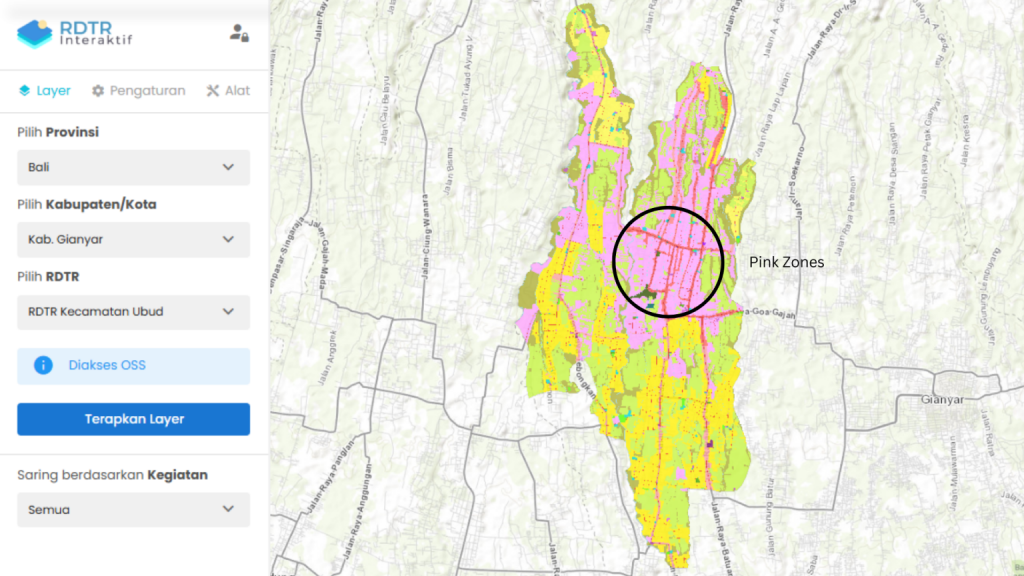If you’re a foreign buyer for Bali Real Estate, curious about how to invest in property here, this conversation distilled the essentials on legal ownership, zoning, and how to make secure, compliant investments on the Island of the Gods. Hey! I’m Jason, a Business Journalist at Bukit Vista, and let me guide you through the Bali Real Estate Laws, Zoning, and Legal Structure by Seven Stones Indonesia on our Bali Business Review during theri event. In this article, I’ll mention key things that you need to understand upon buying your first safe investment here in Bali Real Estate.
Understanding Bali’s Zoning Laws is Critical for Foreign Buyers

Zoning regulations are the single most complicated—and controversial—aspect of buying real estate in Bali. As local authorities use color-coded zones (like yellow for residential, green for agriculture, and commercial zones), knowing what can and cannot be built on a given plot is fundamental.
This is for farming and not suitable for building villas. There are strict regulations in place to protect farmland.
This zone is intended for building villas. However, different subzones allow varying densities of housing. Research is essential to find the right fit for your project.
This area is designated for businesses rather than villas. Understanding the nearby commercial zones can help you gauge the local economy and potential client base.
Ideal for building villas targeting tourists. These areas are designated for accommodations like hotels and villas, making them a favorable choice for villa projects.
These mixed-use zones are suitable for both businesses and housing. They offer a flexible option, allowing you to cater to both locals and tourists with your villa project.
The best advice from the event: always check a property’s zone on the Gisataru online map. Enter your location and review the zoning and permitted activities—currently in Indonesian, with an English version coming soon. For foreigners, misunderstandings here can mean investing in land where building permits or commercial use aren’t even possible.
What Happens if You Buy in the Wrong Zone?
Attendees’ top concern was the risk of mistakenly purchasing property in a green zone (reserved for agriculture). While actual demolition of non-compliant villas is rare, rumors persist—particularly in areas like Uluwatu. Typically, the government allows existing permits and businesses to operate, but you may not be able to expand or legally run a business there if zoning doesn’t allow it.
Mitigation is key: structure your investment properly from the beginning. This means obtaining the correct operational and building permits, and ensuring your title suits your intended use. Failing to do this could leave you exposed—not only to regulatory crackdowns, but also to neighbor or landlord disputes that are hard to defend in local courts.
Legal Paths for Foreigners: Leasehold, Hak Pakai, and PMA Companies
The truth is, Indonesian law does not allow foreign individuals to own freehold land. Yet, many do so through legal grey areas, such as using local nominees or by converting rights into Hak Pakai (right-to-use) or HGB titles. While freehold conversions are “commonly tolerated” and often revertible when selling back to Indonesian citizens, the expert’s advice is clear: use a PMA (foreign-owned company).
A PMA aligns with both Indonesian law and international best practice, shielding foreign investors from legal gray zones that could jeopardize their assets. Operating under a private name might be acceptable tax-wise, but offers far fewer legal protections and exposes foreigners to possible total loss in case of disputes.
Diligence and Compliance: Best Bali Real Estate Practices for Foreign Investors
Before investing, develop a clear business plan: is this property for commercial use, personal residence, or development? Run your numbers, research zoning, and never purchase land “hoping” to fix legal or permit issues later. As in any mature market, Bali’s regulations apply, and local authorities are making processes increasingly transparent—AI tools and online resources now help clarify complex rules.
Above all, set up your investment structure first (preferably a PMA) and ensure full compliance with building and operational regulations. Don’t take shortcuts experts would never consider in their own countries—diligence and common sense offer the safest path and best returns.
For foreigners, Bali’s real estate market offers exciting opportunities but demands respect for local laws and careful planning. The safest path is to understand zoning, structure ownership through a PMA, and always secure proper permits before investing. With proper homework and sound legal setup, your Bali property can deliver safe, lasting returns—an insight hard-earned and freely shared by those in the know.
🗒️ Read the transcript
🗂️ Topic 1: Event Purpose – Real Estate for Foreigners in Bali
The event centered on the do’s and don’ts of real estate investment in Bali, especially for foreign buyers. Discussions covered zoning, ownership, using PMA companies, leaseholds versus freeholds, and essential legal steps to secure investments for foreigners.
🗂️ Topic 2: Most Frequently Asked Question – Zoning Complexities
The hottest and most controversial topic raised by attendees was around zoning—specifically, confusion over residential (yellow), commercial, and green zones, and the challenges of obtaining commercial permits within residential areas. The Batara online map was highlighted as a critical resource for checking zone designations.
🗂️ Topic 3: Risks of Buying in Incorrect Zones
Participants wanted to know: What happens if you accidentally buy property in a green zone intended for agriculture or not for private villas? While rumors of government demolitions exist, such as in Uluwatu, these are rare. Instead, mitigation and proper legal structuring are advised to protect investments and ensure operational compliance.
🗂️ Topic 4: Foreign Ownership Workarounds & Legal Structures
Foreigners technically cannot own freehold land in Indonesia. However, common (though risky) practices include using nominees or converting ownership to Hak Pakai (HGB/Hak Pakai) under certain company structures. The safest route is to own property through a PMA (foreign-owned company) to minimize legal and operational risk.
🗂️ Topic 5: Key Advice for Foreign Investors
Do your due diligence before investing: know your business plan, understand relevant zoning and regulatory requirements, and always set up the correct legal structure first—preferably a PMA. Keep your decision-making grounded in common sense, and leverage AI and online resources to clarify regulations.
Take the First Step to Joining Our Community, Book Your Seat at Our Round Table Talk Today!
At Bukit Vista, we believe in creating lasting partnerships that help nagivate your property to the top 1% in this competitive season. Join us to discover how we can work together.
